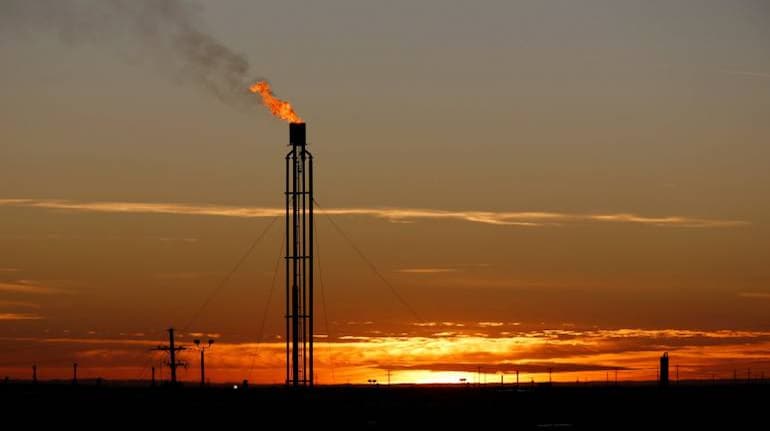



In the doldrums of August, the European natural gas market has perked back to life. The risk of strikes in Australia, the world’s largest producer of liquefied natural gas (LNG), was enough to send prices up 50 percent at one point. Coming weeks before the Oct 1 start of the heating season, the price jump certainly is concerning. However, don’t panic yet.
First, the risk was merely that — a risk. Wage negotiations are progressing, and the disruption will probably be avoided. As the danger has receded, so have prices. But, more importantly, Europe has an even stronger ally to keep gas prices under check heading into the colder months: extremely weak demand.
The manufacturing crisis that’s plaguing the continent — industrial activity in Germany has contracted for 14 consecutive months — is the best antidote against a gas supply squeeze. With friends like that, who needs enemies?
Europe is defeating its energy crisis thanks to the impact that said crisis has had on its industrial heartland. Across the continent, many energy-intensive companies have either closed or reduced production after not being able to cope with higher energy prices. The fertiliser, chemical, metallurgic, glass, paper and ceramic industries are particularly affected. All those shuttered factories don’t need gas or electricity now.
In Germany, activity among energy-intensive companies plunged in June by nearly 18 percent versus late 2020, according to official data. During the same month, industrial gas demand also declined 18 percent compared with a year ago. In July, gas demand posted an even deeper plunge, falling 22.9 percent from a year earlier, the largest decline so far in 2023. When official industrial production data is released for July in a few weeks, that drop in energy needs points to a further deterioration in industrial activity.
Due to anemic manufacturing activity and lower-than-expected gas-burn in the electricity sector, Morgan Stanley reckons that total gas demand in Europe is running about 15 percent below the five-year average, even when adjusted by the impact of the weather. With consumption low and LNG supply so far plentiful, Europe has been able to inject a record amount of gas into underground storage over the spring and summer — despite most countries in the region no longer having access to Russian pipeline gas supply.
European gas stocks are nearly 92 percent full — a record high for this time of the year. If the current injection pace continues, inventories would reach 100 percent by mid-September. So even if the Australian LNG strikes go ahead, Europe is likely to reach tank tops by late October or early November, compared with a 2010-2019 average of 91 percent for that time of the year. The extra buffer should calm the market.
And yet, it would be of little solace for the continent’s industrialists. Currently, European gas prices are running at about €35 ($38) per megawatt hour, compared with the 2010-2020 average of just over €20. Wholesale electricity prices are running above €140 per megawatt hour, more than triple the 2010-2020 average of €38.5.
The problem for the industry isn’t just that current prices are way higher than before Russia invaded Ukraine. The real problem is that companies know that any supply issue, real or perceived, would trigger a price rally, because even with nearly full stockpiles, Europe needs all the gas it can grab to make it through the winter. The manufacturing sector remains the go-to segment of consumption to find extra demand destruction. Hence, why so many chief executive officers are reluctant to bring back production capacity, fearing reactivating a plant only to get caught again by higher prices.
The supply-and-demand gas balance in Europe remains precarious. Only extremely weak industrial demand balances the system. Plentiful inventories help, but even with those, Europe wouldn’t make it through the winter if all the industrial gas demand returned to pre-crisis levels. As such, the price of avoiding the energy crisis is a deep recession in the manufacturing sector, and a long-term loss of economic growth. Ananalysis published by the International Monetary Fund last month says Germany is likely to lose just over 1 percent of potential output.
High prices do solve high prices. But always there’s a cost.
Javier Blas is a Bloomberg Opinion columnist covering energy and commodities. Views are personal and do not represent the stand of this publication.
Credit: Bloomberg
Discover the latest Business News, Sensex, and Nifty updates. Obtain Personal Finance insights, tax queries, and expert opinions on Moneycontrol or download the Moneycontrol App to stay updated!
Find the best of Al News in one place, specially curated for you every weekend.
Stay on top of the latest tech trends and biggest startup news.